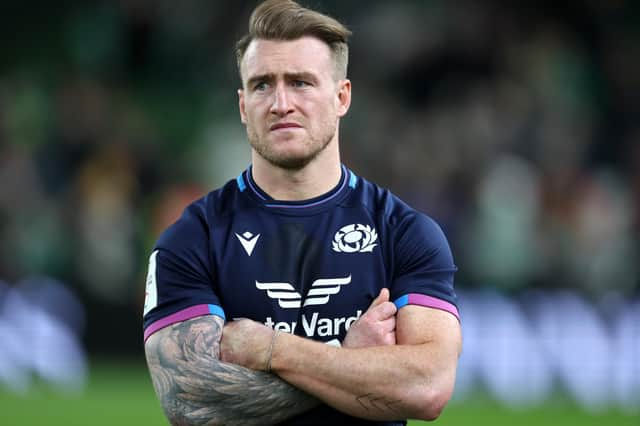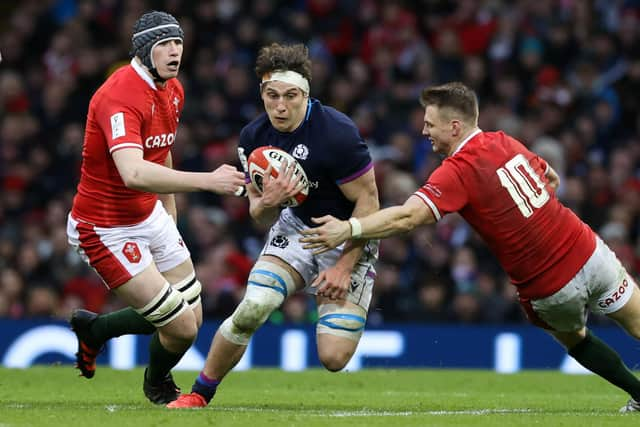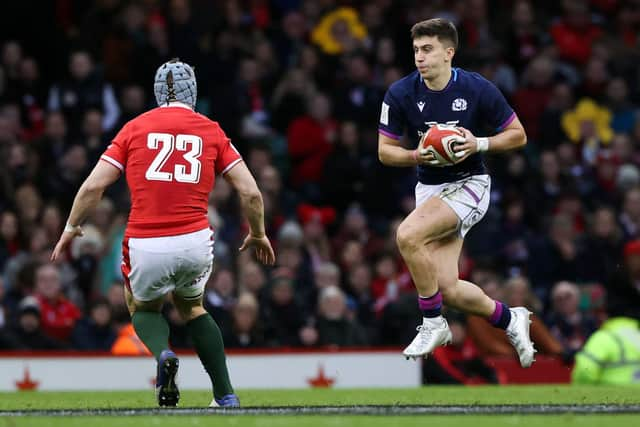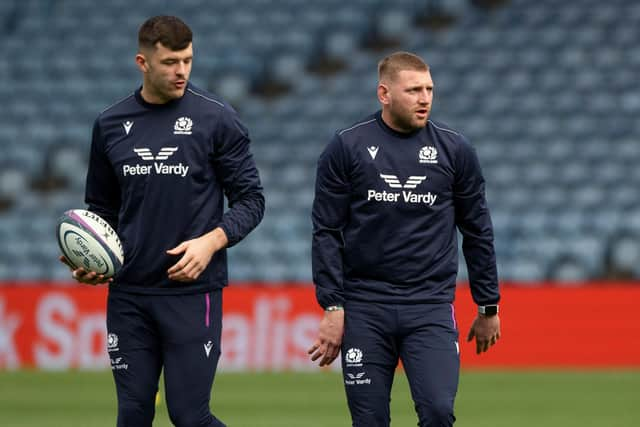2022 Six Nations: Ten things we learned as Scotland imploded, France reigned supreme and Italy turned to Ange-ball


Future of the Scotland captaincy is uncertain
Offered the chance on Sunday to endorse Stuart Hogg’s captaincy going forward, Gregor Townsend blustered about it being “a long time until our next tournament” and said “we’ll have to reflect on everything”. It was hardly a vote of confidence in the full-back who was one of the six players reported to have left the team hotel for an intended night out in Edinburgh following their return from Italy. Hogg has held the post for over two years but Townsend may now feel the time is right for change.
Rory Darge fulfilled his promise


Rory Darge has been consistently excellent since moving from Edinburgh to Glasgow last April but even seasoned observers were surprised by how quickly he made the transition to Test rugby. The flanker won his first cap as a replacement in the defeat by Wales in Cardiff and then marked his first start with a try against France at Murrayfield in a performance that had Townsend praising him as Scotland’s best player on the day. In the absence of the injured Jamie Ritchie, Darge has seized his chance and has the potential to be a fixture in the squad for years to come.
Ange-ball works for Italy
Advertisement
Hide AdAdvertisement
Hide AdNo match in the 2022 Six Nations had a more dramatic ending than Italy’s win over Wales on the final weekend. The 22-21 victory in Cardiff ended a seven-year, 36-game losing streak for the Azzurri whose preparations for the championship were clouded by reports of South Africa being lined up to take their place. Edoardo Padovani got the decisive late try against Wales but the score belonged to Ange Capuozzo, the little Italy full-back who danced his way around the home defence before playing in Padovani. It was only his second cap but Capuozzo had served notice the week before when he stepped off the bench and scored two late tries against Scotland on his debut. He looks a special talent.
Contrition is usually a better approach than truculence


The age-old Scottish sporting tradition of sneaking out for a bevvy ensnared six members of Townsend’s squad and led to a heap of unwanted headlines on the eve of the final match in Ireland. Townsend and Hogg faced the press after the game and were prickly when quizzed about events of the previous weekend. Townsend tried obfuscation, saying it was just one of a number of disappointing things that can happen during a championship. When asked specifically if rules had been broken, the coach tried to shut it down by saying it was “a private matter” and hitting out at “gossip” before adding, somewhat tangentially, that the squad had enjoyed their “best training week of the championship.” Hogg was even less forthcoming but did at least say he had held his hands up and apologised. A PR masterclass, it was not.
Inside centre remains a conundrum
Inside centre is a vexed position for Scotland. Cameron Redpath appears to be Townsend’s first choice but the Bath player has been so blighted by injuries that you worry about his long-term robustness. One start against England last season and a minute off the bench against Wales in this campaign are all he has managed in two Six Nations Championships, with neck issues ending his involvement on both occasions. Redpath offers the creative spark that Townsend craves and the coach is hopeful he will be fit for the summer tour. In the meantime, Scotland flip-flopped between Sam Johnson and Sione Tuipulotu. Johnson was harshly discarded after the win over England and wasn’t even on the bench as Tuipulotu wore 12 against Wales and France. It was hard to make too much of a case for Tuipulotu and Johnson returned for the Italy game with a point to prove, which he duly did, impressing in the five-try win in Rome and retaining his place in the side in Dublin. Johnson is the solid option but Townsend wants more.


The trouble with a bit of success is that it raises expectations
There was a time not so long ago when beating England would have left Scotland supporters delighted, regardless of how the team fared in the other four matches. Not now. Townsend has outfoxed Eddie Jones’ side with such regularity that the latest triumph was met with something akin to polite applause. Maybe it was the nature of the game - Scotland played within themselves but were still too strong for their oldest rivals - or maybe it just lacked the drama of recent Calcutta Cup games (the thrilling win in 2018, the stunning comeback in the crazy 38-38 draw a year later and last season’s victory at Twickenham, Scotland’s first for 38 years). Whatever the reason, it is probably a good thing that our ambitions now extend beyond beating England. The trouble for Townsend is that in three of his four previous campaigns at the helm Scotland have won three championship games. He then trumpeted this squad as the best he had worked with since his own title-winning playing days of 1999, so when they delivered just two victories the feeling is one of underachievement.
France are the real deal
With the World Cup less than 18 months away the only worry for France is that they may have peaked too soon. In securing their first Six Nations title and Grand Slam for 12 years, they lit up the championship with a brand of rugby that looks superior to anything the southern hemisphere can currently muster. As host nation at next year’s global jamboree there will be immense pressure on Fabien Galthie’s side to deliver the Webb Ellis Cup for the first time but it would take a brave person to bet against them.


Don’t write off Finn Russell but he needs a break
Finn Russell was some way below his brilliant best in this championship but there are mitigating circumstances. The stand-off has barely had a break since the start of the 2020-21 season. His involvement with the Lions tour last summer was disrupted by injury but he still went straight back to club rugby with Racing 92 on his return from South Africa. He lost his place to Blair Kinghorn for the game against Ireland but came off the bench in Dublin and showed his eye for a chance by sucking in two defenders and playing in Mark Bennett in one delightful moment. It was vintage Russell. It would be sensible now to excuse Russell from the summer tour of South America and have him back fit and firing for next season and the 2023 Rugby World Cup.
Scotland’s strength in depth doesn’t stand up to scrutiny
Scotland’s formidable strength in depth was a much heard phrase in the build-up to this championship but when injuries began to pile up things started to go awry. The loss of forwards of the quality of Jamie Ritchie, Rory Sutherland, Jonny Gray, Hamish Watson and Matt Fagerson would test any team. All five started the opening win over England but Scotland would be deprived of their services at various points thereafter, with Ritchie and Sutherland the biggest casualties. The reinforcements came, but so did the defeats as Scotland flopped in Wales then found themselves beaten by better teams in France and Ireland.
The six Scotland players who never saw action
Advertisement
Hide AdAdvertisement
Hide AdScotland used 36 players over the course of the championship with captain Stuart Hogg and winger Darcy Graham the only two to play in every minute of every game. The shortest appearance was Cameron Redpath’s as a last minute sub against Wales, but there were also brief cameos from Adam Hastings and Ben Vellacott (four minutes each against Italy). Six players in Townsend’s original Six Nations squad saw no action at all: Ewan Ashman, Scott Cummings, Javan Sebastian, Rory Hutchinson, Rufus McLean and Kyle Rowe. Scotland’s top points scorer was Finn Russell (33) and the top try scorers were Darcy Graham and Chris Harris (two apiece).
A message from the Editor: Thank you for reading this article. We're more reliant on your support than ever as the shift in consumer habits brought about by Coronavirus impacts our advertisers. If you haven't already, please consider supporting our trusted, fact-checked journalism by taking out a digital subscription.
Comments
Want to join the conversation? Please or to comment on this article.

